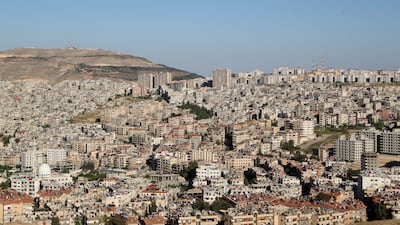Israeli forces fired missiles on Sunday at a central area of Damascus where major security compounds are located, pro-government media said, in a rare attack deep within the capital.
Air raids and other attacks by Israel has increased on Syria in the past few years to curb increased Iranian presence, and what it says is the smuggling of long-range rockets and missiles into Syria.
At least five people were killed in the attack on the upmarket, tightly guarded Kfar Souseh neighbourhood, as well as other areas on the edge of the city, state TV said.
It quoted a military official as saying that shortly after midnight on Sunday Israeli missiles struck several targets in Damascus and its surrundings, including "residential neighbourhoods inhabited by civilians".
He said an initial tally showed one soldier among the five deaths, and 15 civilians wounded.
But a pro-regime Facebook page said two of the dead were members of the military, naming them as Colonel Amjad Ali, and Aksam Isper, a lower ranking soldier.
Israel has struck Damascus dozens of times in the past decade as Iranian reach deepened in Syria, mainly through Hezbollah and other Shiite militias, which are supported by Iran and fighting on behalf of President Bashar Al Assad in the civil war.
Tehran, according to Israel, also oversees the transport of weapons from Iran to its proxies in Syria, through Iraq.
The attack on Kfar Souseh, however, was rare in that it was so near Umayyad Square, the main intersection in the centre of the city. It was also in Kfar Souseh that one of the most senior Hezbollah operatives, Imad Mughniyeh, was assassinated through use of a car bomb in 2008.
Members of the Syrian opposition to the regime said the strike signalled the possibility that a key operative was targeted.
They pointed out that important security compounds, such as the National Security Bureau and intelligence branches are located in Kfar Souseh. The area also has residences for security commanders, some of whom are non-Syrian and linked to Iran, they said.
Although Kfar Souseh is among the most expensive areas of Damascus, many of its security complexes are located next to residential buildings.
A Facebook page for President Bashar Al Assad's loyalists showed a building in Kfar Souseh that was claimed to be the target. It had a white stone facade and appeared damaged.
There was no immediate comment from Israel on the attack, the first first since a 7.8-magnitude earthquake on February 6 hit Turkey and damaged parts of Syria.
Possible targets
The pro-Hezbollah Al Mayadeen Television in Lebanon quoted a representative of Islamic Jihad, one of the most pro-Iranian Palestinian militant groups present in Damascus, as denying rumours that Akram Al Ajouri, one of its commanders, was the target of the Israeli raid.
The last known attack on Damascus, on January 2, temporarily put the city's airport out of service and reportedly killed two Syrian soldiers.
Wael Alwan, director of information at the Syrian research centre Jusoor, said Sunday's strike on Kfar Souseh could be part of Israeli attempts to disrupt the flow of weapons from Iran to Syria, which may have picked up after the earthquake under the guise of aid for victims in regime areas.
He said the attack might have aimed to disrupt the command and control of smuggling efforts.
"The attack this morning was one of the largest Israeli strikes. Targeting Kfar Souseh means they were after someone important," he said from Istanbul.
He said that in relative terms Kfar Souseh is "densely populated" with security elements under civilian guise, whether Syrian intelligence, Hezbollah or members of the Islamic Revolutionary Guard Corps, the main Iranian organisation in charge of relations with Tehran's militia proxies.
Mr Alwan said there was speculation that the Israelis may have been aiming for an Iraqi commander linked to the IRGC.
"If he was, it appears that they missed him," he said.








